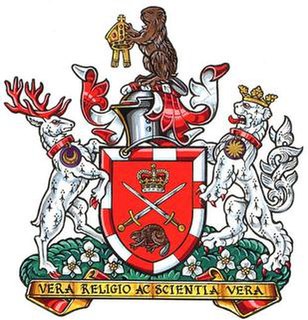
The University of California, Berkeley is a public research university in Berkeley, California. Founded in 1868, it is the flagship campus and the oldest of the ten campuses of the University of California. Berkeley has been ranked by numerous major education publications as among the top 10 universities in the world.
Collaborative software or groupware is application software designed to help people working on a common task to attain their goals. One of the earliest definitions of groupware is "intentional group processes plus software to support them".

Geothermal energy is thermal energy generated and stored in the Earth. Thermal energy is the energy that determines the temperature of matter. The geothermal energy of the Earth's crust originates from the original formation of the planet and from radioactive decay of materials .The adjective geothermal originates from the Greek roots γη (geo), meaning earth, and θερμος (thermos), meaning hot.
The Fulbright Program, including the Fulbright–Hays Program, is one of several United States Cultural Exchange Programs whose goal is to improve intercultural relations, cultural diplomacy, and intercultural competence between the people of the United States and other countries through the exchange of persons, knowledge, and skills. Via the program, competitively-selected American citizens including students, scholars, teachers, professionals, scientists and artists may receive scholarships or grants to study, conduct research, teach, or exercise their talents abroad; and citizens of other countries may qualify to do the same in the United States of America. The program was founded by United States Senator J. William Fulbright in 1946 and is considered to be one of the most widely recognized and prestigious scholarships in the world. The program provides approximately 8,000 grants annually – roughly 1,600 to U.S. students, 1,200 to U.S. scholars, 4,000 to foreign students, 900 to foreign visiting scholars, and several hundred to teachers and professionals.
OpenRISC is a project to develop a series of open-source hardware based central processing units (CPUs) on established reduced instruction set computer (RISC) principles. It includes an instruction set architecture (ISA) using an open-source license. It is the original flagship project of the OpenCores community.

The Rhine–Main–Danube Canal, in Bavaria, Germany, connects the Main and the Danube rivers across the European Watershed, running from Bamberg via Nuremberg to Kelheim. The canal connects the North Sea and Atlantic Ocean to the Black Sea, providing a navigable artery between the Rhine delta, and the Danube Delta in south-eastern Romania and south-western Ukraine. The present canal was completed in 1992 and is 171 kilometres (106 mi) long.

The Erasmus Programme is a European Union (EU) student exchange programme established in 1987. Erasmus+, or Erasmus Plus, is the new programme combining all the EU's current schemes for education, training, youth and sport, which was started in January 2014.

Friedrich–Alexander University Erlangen–Nürnberg is a public research university in the cities of Erlangen and Nuremberg in Bavaria, Germany. The name Friedrich–Alexander comes from the university's first founder Friedrich, Margrave of Brandenburg-Bayreuth, and its benefactor Christian Frederick Charles Alexander, Margrave of Brandenburg-Ansbach.
A Diplom is an academic degree in the German-speaking countries Germany, Austria, and Switzerland and a similarly named degree in some other European countries including Albania, Bulgaria, Belarus, Bosnia and Herzegovina, Croatia, Estonia, Finland, Poland, Russia, and Ukraine and only for engineers in France, Greece, Hungary, North Macedonia, Romania, Serbia, Slovenia, and Brazil.

Huron University College is an affiliated University College of the University of Western Ontario in London, Ontario, Canada. Huron was incorporated on 5 May 1863 and is the founding institution of the University of Western Ontario.
The cancer Biomedical Informatics Grid (caBIG) was a US government program to develop an open-source, open access information network called caGrid for secure data exchange on cancer research. The initiative was developed by the National Cancer Institute and was maintained by the Center for Biomedical Informatics and Information Technology (CBIIT). In 2011 a report on caBIG raised significant questions about effectiveness and oversight, and its budget and scope were significantly trimmed. In May 2012, the National Cancer Informatics Program (NCIP) was created as caBIG's successor program.

Mary Margaret McKeown is a United States Circuit Judge of the United States Court of Appeals for the Ninth Circuit, and is based in San Diego, California. McKeown has served on the Ninth Circuit since her confirmation in 1998.

St. Joseph's College (SJC), Tiruchirappalli in Tamil Nadu, India, was established in 1844 by the Society of Jesus (Jesuits). It was affiliated to Madras University in 1869 and is currently an affiliated first grade college of Bharathidasan University. It is the only college in Tamil Nadu awarded with "Heritage Status" by UGC.

The University of Pristina is a public higher education institution located in Pristina, Kosovo. It is the institution that emerged after the disestablishment of the University of Pristina (1969–1999) as a result of the Kosovo War. The inauguration of the university was a historical occurrence not only for the people of Kosovo, but for the whole Albanian nation. On 15 February, the solemn Parliament session took place, which is also proclaimed as The University of Pristina's Day. In the composition of the newly established University of Pristina were faculties with their headquarters in Pristina: the Faculty of Philosophy, Faculty of Law and Economics, Faculty of Engineering and Faculty of Medicine. Now the University of Pristina has 17 faculties, of which 14 are academic faculties, and 3 are faculties of applied sciences. Contained within the emblem is a translation of the name into Latin, Universitas Studiorum Prishtiniensis.
The University of British Columbia's Okanagan Campus is a campus of the University of British Columbia, located in Kelowna, British Columbia, Canada. It is home to over 10,755 undergraduate and graduate students. The 209-hectare (516-acre) campus is the research and innovation hub in the southern interior of the province, in British Columbia's Okanagan Valley. UBCO has 62 undergraduate programs and 19 graduate programs. The University of British Columbia's Okanagan Campus also resides on the traditional unceded Syilx territory.

Uma Chowdhry is an American chemist whose career has been spent in research and management positions with E. I. du Pont de Nemours and Company. She has specialized in the science of ceramic materials, including catalysts, proton conductors, superconductors and ceramic packaging for microelectronics.

Cadmium telluride (CdTe) photovoltaics describes a photovoltaic (PV) technology that is based on the use of cadmium telluride in a thin semiconductor layer designed to absorb and convert sunlight into electricity. Cadmium telluride PV is the only thin film technology with lower costs than conventional solar cells made of crystalline silicon in multi-kilowatt systems.
A Bachelor of Science is an undergraduate academic degree awarded for programs that generally last three to five years. The first university to admit a student to the degree of Bachelor of Science was the University of London in 1860.
Ellis Batten “Bo” Page Ed.D. is widely acknowledged as the father of automated essay scoring, a multi-disciplinary field exploring computer evaluation and scoring of student writing, particularly essays. Page’s development of and pioneering work with Project Essay Grade (PEG) software in the mid-1960s set the stage for the practical application of computer essay scoring technology following the microcomputer revolution of the 1990s.
Transactive energy refers to the economic and control techniques used to manage the flow or exchange of energy within an existing electric power system in regards to economic and market based standard values of energy. It is a concept that is used in an effort to improve the efficiency and reliability of the power system, pointing towards a more intelligent and interactive future for the energy industry.










